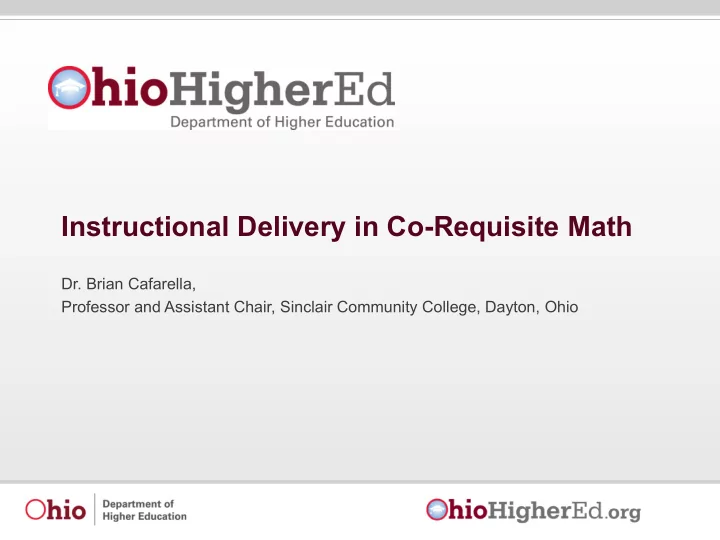

Instructional Delivery in Co-Requisite Math Dr. Brian Cafarella, Professor and Assistant Chair, Sinclair Community College, Dayton, Ohio
Challenge 1: Coordinating among Instructors • Consistency among instructors with co-requisite course delivery • Coordination if the gateway course instructor is different than the co-requisite course instructor (paired course model) • Pacing remediation • Increasing collaboration among faculty 2
Our Experience • We have booster courses for College Algebra, Finite Math, Quantitative Reasoning, and Introduction to Statistics. • We utilize a common workbook with activities for each co-requisite course. Instructors can certainly deviate to accommodate students; however, the workbooks provide a baseline. • The same instructor teaches the co-requisite course as well as the college-level course. 3
Our Experience (continued) • There is an outline in the teaching syllabus to help pace the remediation. • There is regular communication among faculty. • Faculty have the freedom to address the needs of their individual students. 4
Challenge 2: Active Learning • Engaging students collaboratively across skill sets • Supporting co-requisite programming as a learning community • Adjusting room and facility arrangements • Modifications to your instructional style 5
Our Experience • We are questioning whether the time allotted for some booster courses (e.g.. Quantitative Reasoning) is too long. • The booster course directly before the college-level class can create three- or four-hour blocks of time, which is taxing. However, many of our students only come to campus two days a week. 6
Our Experience (continued) • It is imperative to allow faculty to use the necessary tools to meet the needs of a specific class. • For the quantitative reasoning, group-based instruction is an effective pedagogy for some classes but not for others. • Student engagement is imperative; however, this can be achieved in different ways. • We do not utilize learning communities. • The co-requisite course and college-level course meet in the same classroom 7
Challenge 3: Use of OER and online resources • Identifying quality open educational resources (OER) • Finding instructional materials for students with varying skills • Online homework • Flipped classrooms • Hybrid delivery • On-line only delivery 8
Our Experience • We have started to pilot MyOpenLab as a cost saver to students. • We currently use MyMathLab, which contains online assignments. • We do not use hybrid models or flipped learning. • All our courses that use co-requisites are offered online. The online sections utilize discussion groups and worksheets. 9
Recommend
More recommend